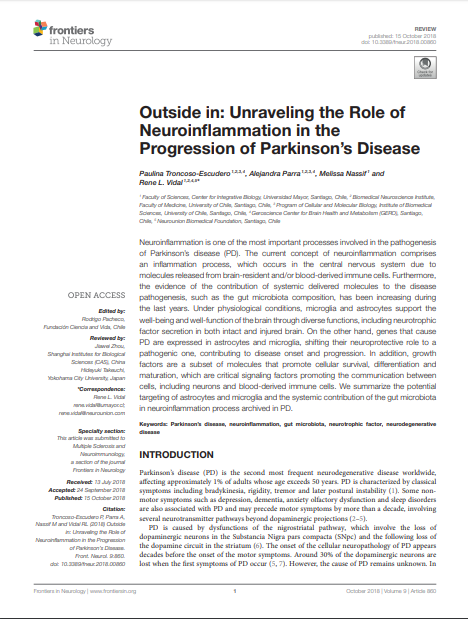Outside in: Unraveling the Role of Neuroinflammation in the Progression of Parkinson's Disease

Fecha
2018Autor
Troncoso-Escudero, Paulina [Univ Mayor, Ctr Integrat Biol, Fac Sci, Santiago, Chile]
Parra, Alejandra [Univ Mayor, Ctr Integrat Biol, Fac Sci, Santiago, Chile]
Nassif, Melissa [Univ Mayor, Ctr Integrat Biol, Fac Sci, Santiago, Chile]
Vidal, Rene L. [Univ Mayor, Ctr Integrat Biol, Fac Sci, Santiago, Chile]
Ubicación geográfica
Notas
HERRAMIENTAS
Acceda a títulos restringidos
¿Cómo descargar?Resumen
Neuroinflammation is one of the most important processes involved in the pathogenesis of Parkinson's disease (PD). The current concept of neuroinflammation comprises an inflammation process, which occurs in the central nervous system due to molecules released from brain-resident and/or blood-derived immune cells. Furthermore, the evidence of the contribution of systemic delivered molecules to the disease pathogenesis, such as the gut microbiota composition, has been increasing during the last years. Under physiological conditions, microglia and astrocytes support the well-being and well-function of the brain through diverse functions, including neurotrophic factor secretion in both intact and injured brain. On the other hand, genes that cause PD are expressed in astrocytes and microglia, shifting their neuroprotective role to a pathogenic one, contributing to disease onset and progression. In addition, growth factors are a subset of molecules that promote cellular survival, differentiation and maturation, which are critical signaling factors promoting the communication between cells, including neurons and blood-derived immune cells. We summarize the potential targeting of astrocytes and microglia and the systemic contribution of the gut microbiota in neuroinflammation process archived in PD.
Coleccion/es a la/s que pertenece:
Si usted es autor(a) de este documento y NO desea que su publicación tenga acceso público en este repositorio, por favor complete el formulario aquí.